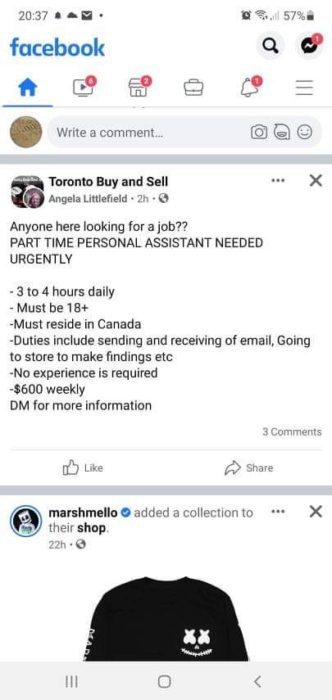A Toronto resident says she now owes her bank CAD $2,000 after a work-from-home scam targeted her.
Zaya Aly, 27, is a freelance interior designer looking to find a part-time job to make ends meet. She came across a job posting on Oct. 9 in a Facebook group advertising for a virtual personal assistant. The posting said it was a good-paying job that only required three to five hours of work per day.

After applying, Aly received a swift response from the “employer” to interview for the position.
“It was weird at first that they wanted to interview me on Telegram, but I thought this was to check how attentive and reliable I was to answer my phone, and I brushed it off,” she said.
Telegram is a messaging application just like WhatsApp. It’s used to stay in touch with friends and family and is very popular in India. But legitimate companies will use either a phone interview or video platform like Zoom to screen applicants, according to Indeed.
Aly said she was hired immediately and received no training.
After a few hours of work, Aly was asked to create a work email and asked to transfer funds to customers using Apple gift cards. She then received two cheques for $1,000 each from the “employer.”
Aly was to purchase gift cards from the “money” sent, and provide the employer or their supposed clients with the details of the gift cards so they could redeem them.
She was skeptical about how fast things were moving, so she asked for compensation to make sure she was getting paid after her first day of work.
“The employer agreed, and told me she was going to send me a cheque on Saturday morning with my pay. Saturday, I received an email with $2,000. I contacted her and told her that she had made a mistake and the pay was $200, not $2000. She told me she knows, but the remaining is for me to buy more cards, VISA prepaid cards this time.”
Both cheques bounced.
Aly mentioned to Toronto Observer that her bank has been uncooperative, and uninformative towards the situation, and now she’s $2,000 in debt.
If the individual happens to spend the money before the cheque bounces, in this case, the amount is deducted from their bank account, resulting in a loss of personal funds. If the individual had no funds to begin with, the amount spent would be considered an overdraft.
According to Better Business Bureau (BBB), there was a 27 per cent rise in employment scams between 2018-2020, and complaints to Canada’s Consumer Anti-Fraud Centre doubled in 2020.
“These people are doing this just out of wickedness,” Aly said. “It’s an easy way to make money, and the fact that there is no prescribed legal action for such scams is what is making it even easier to get away with.”
Here are some tips to avoid job scams according to the BBB:
- Legitimate employers will never ask for payment upfront for a job
- Be wary of job offers that don’t require an interview
- Be wary of big money for small jobs
- Never work for a company before they hire you
- Some positions are more likely to be scams
- Different procedures should raise your suspicion
- Never deposit unexpected or fishy checks
- Government agencies post all jobs publicly and freely
- Get all details and contracts in writing
Individuals can also reach out to the Canadian Anti-Fraud Centre to report scams like this and file an official complaint with the police.








